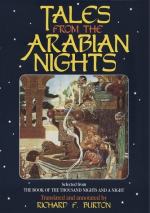N.B.—In using this Table, some allowance must be made for differences in the titles of many of the tales in different editions. For the contents of the printed text, I have followed the lists in Mr. Payne’s “Tales from the Arabic,” vol. iii.
And here I end this long volume with repeating in other words and other tongue what was said in “L’Envoi":—
Hide thou whatever here is
found of fault;
And laud The Faultless and His might exalt!
After which I have only to make my bow and to say
“Salam.”
Arabian Nights,
Volume 10
Footnotes
[FN#1] Arab. “Zarabin” (pl. of zarbun), lit. slaves’ shoes or sandals (see vol. iii. p. 336) the chaussure worn by Mamelukes. Here the word is used in its modern sense of stout shoes or walking boots.
[FN#2] The popular word means goodness, etc.
[FN#3] Dozy translates “’Urrah"=Une Megere: Lane terms it a “vulgar word signifying a wicked, mischievous shrew.” But it is the fem. form of ’Urr=dung; not a bad name for a daughter of Billingsgate.
[FN#4] i.e. black like the book of her actions which would be shown to her on Doomsday.
[FN#5] The “Kunafah” (vermicelli-cake) is a favourite dish of wheaten flour, worked somewhat finer than our vermicelli, fried with samn (butter melted and clarified) and sweetened with honey or sugar. See vol. v. 300.
[FN#6] i.e. Will send us aid. The Shrew’s rejoinder is highly impious in Moslem opinion.
[FN#7] Arab. Asal Katr; “a fine kind of black honey, treacle” says Lane; but it is afterwards called cane-honey (’Asal Kasab). I have never heard it applied to “the syrup which exudes from ripe dates, when hung up.”
[FN#8] Arab. “’Aysh,” lit.=that on which man lives: “Khubz” being the more popular term. “Hubz and Joobn” is well known at Malta.
[FN#9] Insinuating that he had better make peace with his wife by knowing her carnally. It suggests the story of the Irishman who brought over to the holy Catholic Church three several Protestant wives, but failed with the fourth on account of the decline of his “Convarter.”
[FN#10] Arab. “Asal Kasab,” i.e. Sugar, possibly made from sorgho-stalks Holcus sorghum of which I made syrup in Central Africa.
[FN#11] For this unpleasant euphemy see vol. iv. 215.
[FN#12] This is a true picture of the leniency with which women were treated in the Kazi’s court at Cairo; and the effect was simply deplorable. I have noted that matters have grown even worse since the English occupation, for history repeats herself; and the same was the case in Afghanistan and in Sind. We govern too much in these matters, which should be directed not changed, and too little in other things, especially in exacting respect for the conquerors from the conquered.
[FN#13] Arab. “Bab al-’Ali"=the high gate or Sublime Porte; here used of the Chief Kazi’s court: the phrase is a descendant of the Coptic “Per-ao” whence “Pharaoh.”




